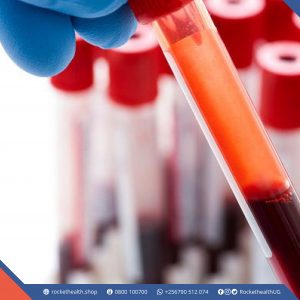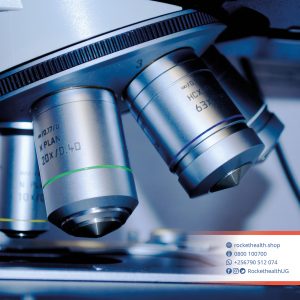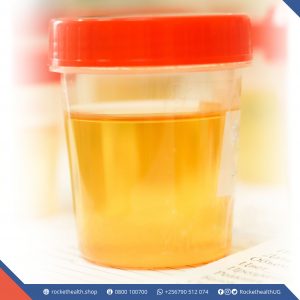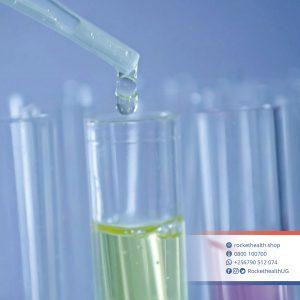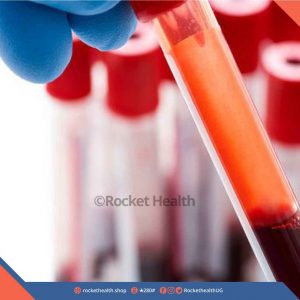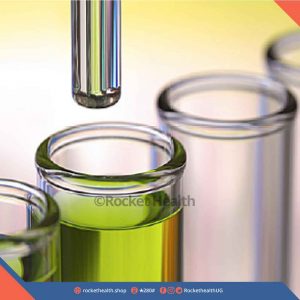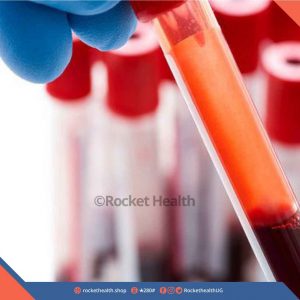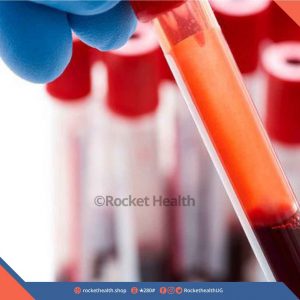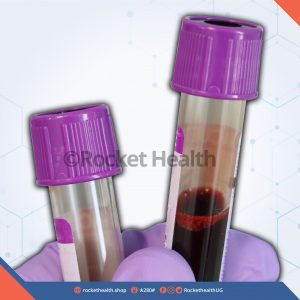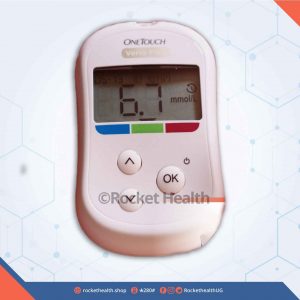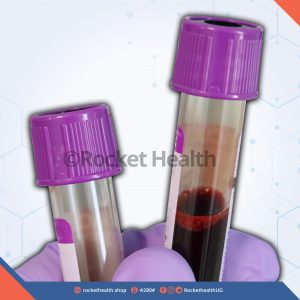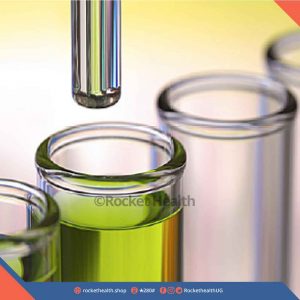No products in the cart.
Typhoid (blood) test
This is a blood test used to check for Typhoid fever.
Blood.
No specific patient preparation protocol required. Inform your doctor if you are on any medications or have any underlying medical conditions or allergies before undergoing this test.
Typhoid is a systemic disease characterised by fever and abdominal pain caused by the bacterium Salmonella typhimurium (S. typhi). The bacterium lives in the intestines and bloodstream of humans. Typhoid is spread by eating or drinking food or water contaminated with the feces of an infected person
UGX 15,000Typhoid (blood) test
UGX 15,000SPUTUM ZN-STAIN
Laboratory test performed on a sample of your sputum to help diagnose if you have TB. A culture is another kind of test that may be done to detect the presence of TB bacteria.
Blood.
No specific patient preparation protocol required.
Mycobacterium tuberculosis (the cause of tuberculosis) can be identified using a staining technique called the Zhiel-Nielsen stain. This test makes it possible to visualise the organism in the microscope by staining it basing on the properties of its cell wall.
UGX 15,000SPUTUM ZN-STAIN
UGX 15,000URINALYSIS
A urinalysis is a lab test used to detect cells and substances in the urine. it is used to diagnose urinary tract infections, kidney disorder, diabetes and other conditions.
Urine.
No specific patient preparation protocol required. Inform your doctor if you are on any medications or have any underlying medical conditions or allergies before undergoing this test.
A urinalysis is a group of physical, chemical, and microscopic tests. The tests detect and/or measure several substances in the urine, such as byproducts of normal and abnormal metabolism, cells, cellular fragments, and bacteria.
UGX 10,000URINALYSIS
UGX 10,000URIC ACID
This blood test is used to check for gout and also monitor people undergoing chemotherapy or radiation treatment for cancer.
Blood.
No specific patient preparation protocol required. Inform your doctor if you are on any medications or have any underlying medical conditions or allergies before undergoing this test.
Uric acid is produced by the breakdown of purines. Purines are nitrogen-containing compounds found in the cells of the body, including our DNA. If too much uric acid is produced or not enough is removed, it can accumulate in the body, causing increased levels in the blood (hyperuricemia). The presence of excess uric acid can cause gout, a condition characterized by inflammation of the joints due to the formation of uric acid crystals in the joint (synovial) fluid. Excess uric acid can also be deposited in tissues such as the kidney, leading to kidney stones or kidney failure.
UGX 30,000URIC ACID
UGX 30,000SYPHILLIS TEST (TPHA)
This blood test is used to check for presence of the bacteria that causes syphilis.
Blood.
No specific patient preparation protocol required. Inform your doctor if you are on any medications or have any underlying medical conditions or allergies before undergoing this test.
Syphilis is an infection caused by the bacterium Treponema pallidum that is most often spread by sexual contact, such as through direct contact with a syphilis sore (chancre), a firm, raised, painless sore. The most common syphilis tests detect antibodies in the blood that are produced in response to a T. pallidum infection.
UGX 15,000SYPHILLIS TEST (TPHA)
UGX 15,000STOOL ANALYSIS
These are series of stool tests used to check for digestive tract infection, viruses, bacteria, poor nutrient absorption or cancer.
Stool.
No specific patient preparation protocol required. Inform your doctor if you are on any medications or have any underlying medical conditions or allergies before undergoing this test.
For a stool analysis, a stool sample is collected in a clean container and then sent to the laboratory. Laboratory analysis includes microscopic examination, chemical tests, and microbiologic tests. The stool will be checked for color, consistency, amount, shape, odor, and the presence of mucus. The stool may be examined for hidden (occult) blood, fat, meat fibers, bile, white blood cells, and sugars called reducing substances. The pH of the stool also may be measured. A stool culture is done to find out if bacteria may be causing an infection.
UGX 15,000STOOL ANALYSIS
UGX 15,000SERUM LIPASE
This blood test measures the level of lipase to check for acute pancreatitis.
Blood.
Inform your doctor if you are on any medications or have any underlying medical conditions or allergies before undergoing this test. Fasting of 8 hours is usually recommended before this test.
Lipase is produced by the pancreas in the body. It is a protein-based enzyme which plays a role in the digestion and breakdown of fats in the stomach. Impaired function of the pancreas due to injury or infections or diseases may lead to increased or decreased release of lipase from the pancreas. Lipase levels can be used to diagnose any disease/condition which may be affecting the function of pancreas.
UGX 30,000SERUM LIPASE
UGX 30,000SERUM AMYLASE
This blood tests is used to check for disease in the pancreas.
Blood.
No specific patient preparation protocol required. Inform your doctor if you are on any medications or have any underlying medical conditions or allergies before undergoing this test.
Amylase is an enzyme and a special protein which is useful in digestion. It is produced primarily by the pancreas and the salivary glands to help digest carbohydrates. The pancreas is an organ present behind your stomach. When pancreas function is impaired or if there is an inflammation of pancreas too much or too little of amylase is released into your blood. Thus amylase blood test may detect any problems related to the pancreas.
UGX 28,000SERUM AMYLASE
UGX 28,000RHEUMATOID FACTOR
This blood test is used for the diagnosis of rheumatoid arthritis. High levels of rheumatoid factor in the blood are most often associated with autoimmune diseases, such as rheumatoid arthritis and Sjogren’s syndrome.
Blood.
No specific patient preparation protocol required. Inform your doctor if you are on any medications or have any underlying medical conditions or allergies before undergoing this test.
Rheumatoid factor (RF) is an autoantibody, an immunoglobulin M (IgM) protein that is produced by the body’s immune system. Autoantibodies attack a person’s own tissues, mistakenly identifying the tissue as “foreign.”
UGX 25,000RHEUMATOID FACTOR
UGX 25,000RENAL FUNCTION TEST
This is a panel of blood tests that check if your kidneys are functioning well.
Blood.
No specific patient preparation protocol required. Inform your doctor if you are on any medications or have any underlying medical conditions or allergies before undergoing this test.
A group of tests that are performed together to evaluate kidney function. The tests measure levels of various substances, including several minerals, metabolites and electrolytes in the blood to determine the current health of your kidneys.
UGX 45,000RENAL FUNCTION TEST
UGX 45,000RANDOM BLOOD SUGAR (RBS)
This is test that measures blood glucose regardless of when you last had a meal. Random testing is useful because glucose levels in healthy people do not vary widely through out the day so glucose levels that vary widely may mean a problem.
Blood.
No specific patient preparation protocol required. Inform your doctor if you are on any medications or have any underlying medical conditions or allergies before undergoing this test.
Glucose is the primary energy source for the body’s cells and the only energy source for the brain and nervous system. A steady supply must be available for use, and a relatively constant level of glucose must be maintained in the blood. A random blood sugar test is used to measure the amount of glucose (sugar) in your blood without any fasting conditions. In this test, the blood is drawn randomly at any point of time in a day.
UGX 8,000RANDOM BLOOD SUGAR (RBS)
UGX 8,000PROSTATE SPECIFIC ANTIGEN (FREE)
This test is used to determine risk of prostate cancer.
Blood.
No specific patient preparation protocol required.
Prostate specific antigen (PSA) is a protein produced primarily by cells in the prostate, a small gland that encircles the urethra in males and produces a fluid that makes up part of semen. Most of the PSA that the prostate produces is released into this fluid, but small amounts of it are also released into the bloodstream. Prostate-specific antigen test indicates the presence of prostate cancer, prostatitis or an enlarged prostate gland in men.
UGX 80,000PROSTATE SPECIFIC ANTIGEN (FREE)
UGX 80,000PROSTATE SPECIFIC ANTIGEN (TOTAL)
Test used to screen for prostate cancer.
Blood.
No specific patient preparation protocol required
Prostate specific antigen (PSA) is a protein produced primarily by cells in the prostate, a small gland that encircles the urethra in males and produces a fluid that makes up part of semen. Most of the PSA that the prostate produces is released into this fluid, but small amounts of it are also released into the bloodstream. Prostate-specific antigen test indicates the presence of prostate cancer, prostatitis or an enlarged prostate gland in men.
UGX 60,000PROSTATE SPECIFIC ANTIGEN (TOTAL)
UGX 60,000PERIPHERAL BLOOD FILM
This test is used to look for abnormalities in blood cells and enables diagnoses of many illnesses.
Blood.
No specific patient preparation protocol required. Inform your doctor if you are on any medications or have any underlying medical conditions or allergies before undergoing this test.
A blood film is a drop of blood spread thinly onto a glass slide that is then treated with a special stain and the blood cells on the slide are examined and evaluated.
UGX 30,000PERIPHERAL BLOOD FILM
UGX 30,000ORAL GLUCOSE TOLERANCE TEST
This test enables diagnosis of type 2 diabetes and gestational diabetes in pregnant women.
Blood.
Inform your doctor if you are on any medications, have any allergies or underlying medical conditions before this test. The individual undertaking the test should fast for 12 hours prior to the test and have a meal with at least 75 gms of carbohydrates. After the meal, the patient should not take any food before having the test. Take rest for two hours during the waiting period and do not work or strain yourself because exercise may sometimes increase the blood sugar levels. If you are pregnant then there is no need to fast.
Glucose is the primary energy source for the body’s cells and the only energy source for the brain and nervous system. A steady supply must be available for use, and a relatively constant level of glucose must be maintained in the blood Postprandial blood sugar test is used to measure the amount of glucose present in our blood, after two hours of eating. This test indicates how your body responds to sugar and starch after you have a meal.
UGX 40,000ORAL GLUCOSE TOLERANCE TEST
UGX 40,000MALARIA BLOODSLIDE + RDT
These are tests used to diagnose malaria. All suspected cases of malaria are confirmed using either microscopy or a rapid diagnostic test.
Blood.
Inform your doctor if you are on any medications or have any underlying medical conditions or allergies before undergoing this test. For this test, fasting for at least 8 to 12 hours is recommended.
Malaria is an infectious disease caused by Plasmodium parasites. These parasites are primarily spread by the bite of infected female Anopheles mosquitos.
UGX 10,000MALARIA BLOODSLIDE + RDT
UGX 10,000LIVER FUNCTION TEST
This panel of blood tests helps to determine how well your liver is functioning.
Blood.
Inform your doctor if you are on any medications or have any underlying medical conditions or allergies before undergoing this test. Fasting of 8 hours is usually recommended before this test.
Liver function test is a set of blood tests used to monitor the working of the liver or to screen the liver damage or inflammation. . This test also measures the amount of certain enzymes and proteins in the blood. Some of these tests are helpful in estimating the performance of the liver functions like producing proteins, clearing of waste products in blood like bilirubin and some tests are used to measure the amount of enzymes that are produced by the liver which may indicate damage of the liver.
UGX 50,000LIVER FUNCTION TEST
UGX 50,000LIPID PROFILE (Blood Cholestrol test)
This is a panel of blood tests used to measure the level of specific lipids like cholesterol, triglycerides in blood. Results can show approximate risk of heart disease.
Blood.
Inform your doctor if you are on any medications or have any underlying medical conditions or allergies before undergoing this test. For this test, fasting for at least 8 to 12 hours is recommended.
Lipids are a group of fats and fat-like substances that are important constituents of cells and sources of energy. Cholesterol and triglycerides are the two important lipids. Cholesterol and triglycerides are transported are circulated into the blood through lipoprotein particles. High-density lipoproteins (HDL) are considered as good cholesterol and low-density lipoproteins (LDL) is considered as bad cholesterol. High-density cholesterol carries cholesterol to the liver from various parts of your body. LDL gets attached to the walls of arteries and clogs them. This leads to a condition called atherosclerosis.
UGX 45,000LIPID PROFILE (Blood Cholestrol test)
UGX 45,000

